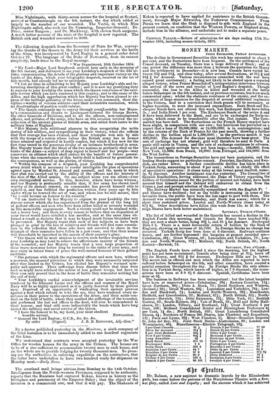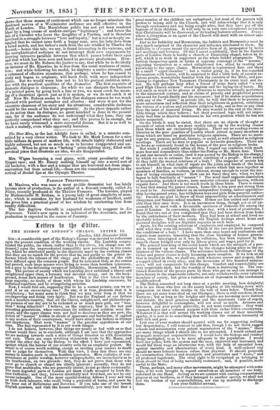tilt It 'Rohm
Mr. Robson, a new aspirant to dramatic laurels by the Elizabethan path, has come before the patrons of the Marylebone Theatre with a five- aot play, called Love and Loyalty; and the success which it has achieved
shows that those means of excitement which can no longer stimulate the deadened nerves of a Westminster audience are still effective in the North of London. The Marylebone public has not yet been rendered blase by a long course of modern-antique "legitimacy " ; and hence the tale of a Cavalier who loves the daughter of a Puritan, and is therefore involved in a struggle between "love and loyalty," but is not so deeply en- tangled that he cannot issue forth a happy man, save his lady-love from a hated match, and her father's neck from the axe wielded by Charles the Second,—hence this tale, we say, is found interesting in the extreme, and the unsophisticated audience do not interrupt their own enjoyments by drawing intrusive parallels between that which passes before their eyes and that which has been seen and heard in previous productions. How- ever, we must do Mr. Robson the justice to say, that while he is decidedly an imitator of Mr. Knowles, he is free from the usual weakness of imita- tion; and while following his model, he displays a native strength, and a command of effective situations, that perhaps, when be has ceased to study and begun to originate, will burst forth with more independent lustre. But we would warn him not to let his poetical ambition inter- fere with the practical qualities of the dramatist. The first requisite of dramatic dialogue is clearness; for while we can dissipate the haziness of a printed poem by going back a line or two, we must catch the mean- ing of a theatrical speech just as it is spoken, or we do not catch it at all. Now Mr. Robson seems to think that dialogue cannot be too much adorned with poetical metaphor and allusion : and were it not for the excessive clearness of his story and his situations, considerable darkness would be the result of his florid propensity. As the piece depends rather on its action than its dialogue, no great mischief is done in the present case, for if the audience do not understand what they hear, they can perfectly comprehend what they see ; and this proves to be enough, for we have rarely witnessed a more successful. drama. But it is as well to check a malady, even while apparently harmless.



































 Previous page
Previous page